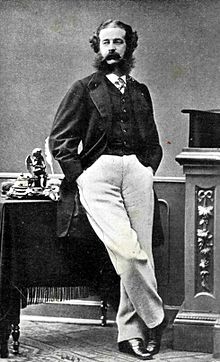Emilio Visconti-Venosta
| Emilio Visconti Venosta | |
|---|---|
 |
|
| Minister of Foreign Affairs | |
|
In office 11 May 1899 – 15 February 1901 |
|
| Prime Minister |
Luigi Pelloux Giuseppe Saracco |
| Preceded by | Felice Napoleone Canevaro |
| Succeeded by | Giulio Prinetti |
|
In office 11 July 1896 – 1 June 1898 |
|
| Prime Minister | Antonio Starabba di Rudinì |
| Preceded by | Onorato Caetani |
| Succeeded by | Raffaele Cappelli |
|
In office 14 December 1869 – 20 November 1876 |
|
| Prime Minister |
Giovanni Lanza Marco Minghetti |
| Preceded by | Luigi Federico Menabrea |
| Succeeded by | Luigi Amedeo Melegari |
|
In office 28 June 1866 – 10 April 1867 |
|
| Prime Minister | Bettino Ricasoli |
| Preceded by | Bettino Ricasoli |
| Succeeded by | Federico Pescetto |
|
In office 24 March 1863 – 28 September 1864 |
|
| Prime Minister | Marco Minghetti |
| Preceded by | Giuseppe Pasolini |
| Succeeded by | Alfonso Ferrero La Marmora |
| Personal details | |
| Born |
22 January 1829 Milan, Italy |
| Died | 24 November 1914 (aged 85) Rome, Italy |
| Political party | Historical Right |
Emilio, marquis Visconti-Venosta (22 January 1829 – 24 November 1914) was an Italian statesman. He is one of the longest-serving Ministers of Foreign Affairs in the history of Italy.
Visconti-Venosta was born at Milan. He studied jurisprudence in Pavia's university.
A disciple of Mazzini, he took part in all the anti-Austrian conspiracies until the ineffectual rising at Milan on 6 February 1853, of which he had foretold the failure, induced him to renounce his Mazzinian allegiance. Continuing, nevertheless, his anti-Austrian propaganda, he rendered good service to the national cause, but being molested by the Austrian police, was obliged in 1859 to escape to Turin, and during the war with Austria of that year was appointed by Cavour royal commissioner with the Garibaldian forces.
Elected deputy in 1860, he accompanied Luigi Carlo Farini on diplomatic missions to Modena and Naples, and was subsequently despatched to London and Paris to acquaint the British and French governments with the course of events in Italy. As a recompense for the tact displayed on this occasion, he was given by Cavour a permanent appointment in the Italian foreign office, and was subsequently appointed under-secretary of state by Count Pasolini. Upon the latter's death he became minister of foreign affairs (March 24, 1863) in the Minghetti cabinet, in which capacity he negotiated the September Convention for the evacuation of Rome by the French troops.
Resigning office with Minghetti in the autumn of 1864, he was in March 1866 sent by la Marmora as minister to Constantinople, but was almost immediately recalled and reappointed foreign minister by Ricasoli. Assuming office on the morrow of the Italian defeat at Custoza, he succeeded in preventing Austria from burdening Italy with a proportion of the Austrian imperial debt, in addition to the Venetian debt proper. The fall of Ricasoli in February 1867 deprived him for a time of his office, but in December 1869 he entered the Lanza-Sella cabinet as foreign minister, and retained his portfolio in the succeeding Minghetti cabinet until the fall of the Right in 1876.
...
Wikipedia
